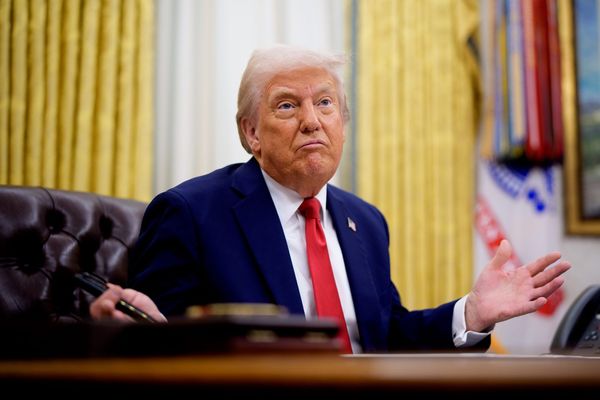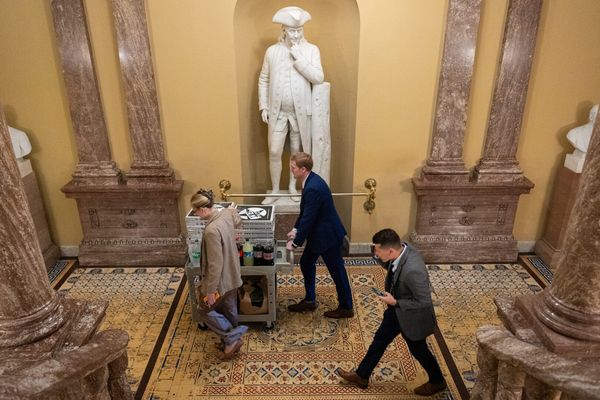WASHINGTON — In an unprecedented step in American history, the House panel investigating the Jan. 6, 2021, attack on the U.S. Capitol unanimously recommended Monday that former President Donald Trump be criminally prosecuted for insurrection, obstruction of an official proceeding of Congress, knowingly and willfully making materially false statements to the federal government and conspiracy to defraud the United States.
The referrals for Trump and others in his orbit are nonbinding recommendations and cannot compel the Justice Department to act. But they show the committee believes it has gathered sufficient evidence to prove Trump provided “aid and comfort” to a mob that ransacked the Capitol and actively tried to prevent the peaceful transition of power to a new president selected by voters, Joe Biden.
“Every president in our history has defended this orderly transfer of authority, except one,” said Rep. Liz Cheney, R-Wyo., the panel’s vice chair. “January 6, 2021, was the first time one American president refused his constitutional duty to transfer power peacefully to the next. In our work over the last 18 months, the select committee has recognized our obligation to do everything we can to ensure this never happens again.”
The committee laid out its rationale and evidence for the referrals in an introductory document released after the hearing. The document hinted that more information will be available when the full report is released later this week.
“This committee will lay out a number of recommendations in this final report,” committee Chairman Rep. Bennie Thompson, D-Miss., said. “But beyond any specific details and recommendations we present, there’s one factor I believe is most important in preventing another Jan. 6 — accountability ... accountability that can only be found in the criminal justice system.”
The committee’s 18-month investigation and nine public hearings this year placed Trump at the center of the effort to overturn the 2020 presidential election and to assemble a mob he directed to Capitol Hill to interfere with the peaceful transfer of power.
“Ours is not a system of justice where foot soldiers go to jail and the masterminds and ringleaders get a free pass,” committee member Rep. Jamie Raskin, D-Md., said while announcing the referrals. “The evidence clearly suggests that President Trump conspired with others to submit slates of fake electors to Congress and the National Archives.”
Raskin said after the hearing that the referrals will go to the Justice Department this week.
The White House declined to say whether it supports the committee’s criminal referrals or the Justice Department pursuing charges against Trump.
The committee also referred California attorney John Eastman for criminal charges, including obstruction. The panel has argued in court that Eastman, the architect of the legal theory embraced by Trump positing that the vice president could reject certain states’ electors, most likely violated two federal laws: obstructing an official act of Congress and defrauding the American public. U.S. District Judge David O. Carter, who is based in California, concluded that Trump and Eastman probably conspired to overturn the election, an act the judge described as “a coup in search of a legal theory.”
In a statement, Eastman responded that the public would have been better served if the committee had focused on Capitol security and elections reform.
“A criminal ‘referral’ from a congressional committee is not binding on the Department of Justice and carries no more legal weight than a ‘referral’ from any American citizen,” Eastman said. “In fact, a ‘referral’ from the January 6th committee should carry a great deal less weight due to the absurdly partisan nature of the process that produced it.”
Raskin said in the hearing that the committee was referring Trump, Eastman and “others” for certain charges, but did not name the other people. In the report’s introduction, which was released after the hearing, the committee identified others whom the panel believes the Justice Department could potentially prosecute, but refrained from urging that they be charged.
“Our criminal referrals were based on the gravity of the offense, the centrality of the actors and the evidence that we had available to us, and there were undoubtedly other people involved, but we were stymied by virtue of a lot of people refusing to come and testify, refusing to give us info they had or taking the Fifth Amendment,” Raskin told reporters after the hearing. “We chose to advance the names of people where we felt certain that there was abundant evidence that they had participated in crimes.”
Republican lawmakers who didn’t comply with committee subpoenas were also referred to the House Ethics Committee: Minority Leader Kevin McCarthy, R-Calif., and Republican Reps. Scott Perry of Pennsylvania, Jim Jordan of Ohio and Andy Biggs of Arizona.
It is unlikely that the committee would take up the referrals with just weeks left before Republicans take control of the House, or that a future panel controlled by GOP lawmakers will consider them.
Four committee members who are also attorneys — Reps. Adam B. Schiff, D-Calif., Zoe Lofgren, D-Calif., Cheney and Raskin — were tasked with determining whom to refer for potential prosecution by the Justice Department or punishment by other entities.
The committee members briefly summarized their findings during Monday’s hearing, providing a preview of the panel’s final report, which is expected to be released in full this week.
Thompson said the committee will make public the bulk of the nonsensitive material it has compiled before the end of the year, though it is unclear exactly what the scope of that material will be.
The introductory report provides vivid new details about attempts by Trump and his allies to change the outcome of the vote through spurious election fraud lawsuits; by pressuring state lawmakers to overturn the will of voters; by efforts to involve high-ranking Justice Department officials and the Supreme Court in the scheme and by convincing people in several key states to sign certificates attesting that Trump had won in order to cast doubt when Congress met to certify results.
Some fake electors told the committee they felt “misled or betrayed” by the Trump campaign because they were under the impression that their pro-Trump slates would not be presented without appropriate action from the courts.
“(I)t was a very consistent message that we were told throughout all of that, (that) the only reason why we’re doing this is to preserve the integrity of being able to have a challenge,” said Shawn Still, a Georgia Republican who was elected to the state Senate last month despite his role in the fake elector plot, according to a transcript of his testimony.
Elsewhere in the report, the committee called out several people close to Trump, including his daughter Ivanka, former chief of staff Mark Meadows and former White House press secretary Kayleigh McEnany, for offering testimony that contradicted multiple other witnesses. On some particularly sensitive points, the testimony appeared to follow talking points from Trump’s legal team, the report states.
The report states that Meadows’ December 2021 book, “The Chief’s Chief,” included “an intentional effort to conceal the facts” about Trump’s desire to go to the Capitol on Jan. 6. The select committee was concerned when other witnesses repeated elements of the book’s false accounts, “as if they were the party line,” according to the report.
Multiple other witnesses told the committee that Trump planned to march to the Capitol after his speech on the morning of Jan. 6, 2021, and was enraged when the Secret Service refused to allow it.
“The Committee has now obtained evidence from several sources about a ‘furious interaction’ in the SUV. The vast majority of witnesses who have testified before the Select Committee about this topic, including multiple members of the Secret Service, a member of the Metropolitan police, and national security officials in the White House, described President Trump’s behavior as ‘irate,’ ‘furious,’ ‘insistent,’ ‘profane’ and ‘heated,’” the report states.
In the report, the committee offered Trump’s possible reasoning behind wanting to go to the Capitol: One witness suggested that Trump hoped to be on the House floor as the electoral votes were counted, “perhaps in an effort to apply further pressure to Vice President Mike Pence and others.”
———
(Los Angeles Times staff writers Courtney Subramanian and Jon Healey contributed to this report.)







